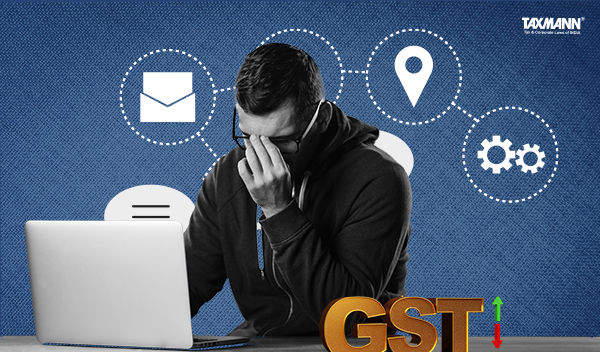[Opinion] Implications of GST on OIDAR Services | An Overview
- Blog|News|GST & Customs|
- 3 Min Read
- By Taxmann
- |
- Last Updated on 7 June, 2024

Sarthak Garg – [2024] 163 taxmann.com 171 (Article)
The introduction of the Goods and Services Tax (“GST“) in India has been a significant reform, streamlining the indirect tax regime and creating a unified market. One of the areas profoundly impacted by GST is the Online Information and Database Access or Retrieval (“OIDAR“) Services due to its digital nature and extensive reach.
OIDAR services encompasses a wide range of digital services including online libraries, databases, information retrieval, and online content access. These services are automated and predominantly provided over the internet, making them crucial for businesses and individuals seeking timely information and data. The distinguishing feature of OIDAR services is its digital nature, which allows for seamless cross-border delivery without the need for a physical presence in the consumer’s country.
The concept of OIDAR services has been a contentious issue since it was first introduced under the erstwhile Service Tax regime. Initially, the scope of the OIDAR services was limited, however, over the years, the scope of OIDAR services has expanded significantly on account of rapid evolution of internet. Accordingly, the need for a cohesive framework to regulate and levy tax on these services became imperative, leading to their inclusion under the GST regime.
In this regard, specific provisions have been enacted under the Integrated Goods & Services Tax Act, 2017 (“IGST Act, 2017“) for administration and collection of GST on OIDAR services. A detailed analysis of the same has been provided below.
Definition & Scope
Section 2(17) of the IGST Act, 2017 defines OIDAR services as:
“online information and database access or retrieval services” means services whose delivery is mediated by information technology over the internet or an electronic network and the nature of which renders their supply
essentially automated and involving minimal human intervention andimpossible to ensure in the absence of information technology and includes electronic services such as, –(i) advertising on the internet;
(ii) providing cloud services;
(iii) provision of e-books, movie, music, software and other intangibles through telecommunication networks or internet;
(iv) providing data or information, retrievable or otherwise, to any person in electronic form through a computer network;
(v) online supplies of digital content (movies, television shows, music and the like);
(vi) digital data storage; and
(vii) online gaming excluding the online money gaming as defined in clause (80B) of section 2 of the Central Goods and Services Tax Act, 2017 (12 of 2017);
(The strikethrough part of the definition has been omitted by the Finance Act, 2023, w.e.f. 1-10-2023.)
From the above definition, it is evident that OIDAR services consists of two parts viz. (i) meaning part; and (ii) illustrative list of transactions (such as internet advertising, cloud services, online streaming services, digital data storage services etc.) which falls within the ambit of OIDAR services. Thus, there is sufficient clarity in relation to the illustrative list of services which are considered as OIDAR services. However, for any other service, the taxpayers are dependent on the interpretation of the meaning part of the definition of OIDAR services.
Prior to the amendment made by the Finance Act, 2023, one of the essential ingredients to qualify as OIDAR services was that the service must be “essentially automated and involving minimal human intervention”. The term “minimal human intervention” has not been defined under GST Law, and the exact degree of human intervention required to keep the service out of the scope of OIDAR service was not clear.
Further, there has been very little guidance available on the meaning of this phrase and therefore, the same resulted in ambiguity and confusion in the industry. Accordingly, in order to remove such ambiguity and confusion, amendment was made to the definition of OIDAR services. Post such an amendment, the taxability of OIDAR services has widened significantly to include any or all services which are dependent on information technology and are delivered over the internet or an electronic network with or without manual intervention.
Click Here To Read The Full Article
Disclaimer: The content/information published on the website is only for general information of the user and shall not be construed as legal advice. While the Taxmann has exercised reasonable efforts to ensure the veracity of information/content published, Taxmann shall be under no liability in any manner whatsoever for incorrect information, if any.

Taxmann Publications has a dedicated in-house Research & Editorial Team. This team consists of a team of Chartered Accountants, Company Secretaries, and Lawyers. This team works under the guidance and supervision of editor-in-chief Mr Rakesh Bhargava.
The Research and Editorial Team is responsible for developing reliable and accurate content for the readers. The team follows the six-sigma approach to achieve the benchmark of zero error in its publications and research platforms. The team ensures that the following publication guidelines are thoroughly followed while developing the content:
- The statutory material is obtained only from the authorized and reliable sources
- All the latest developments in the judicial and legislative fields are covered
- Prepare the analytical write-ups on current, controversial, and important issues to help the readers to understand the concept and its implications
- Every content published by Taxmann is complete, accurate and lucid
- All evidence-based statements are supported with proper reference to Section, Circular No., Notification No. or citations
- The golden rules of grammar, style and consistency are thoroughly followed
- Font and size that’s easy to read and remain consistent across all imprint and digital publications are applied



 CA | CS | CMA
CA | CS | CMA
